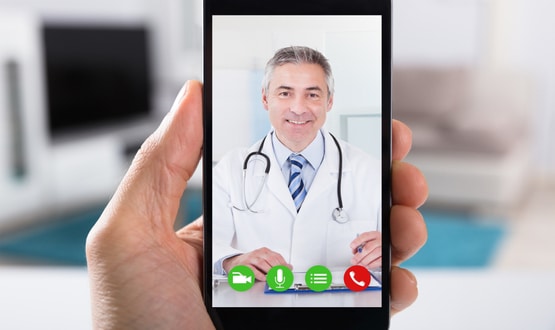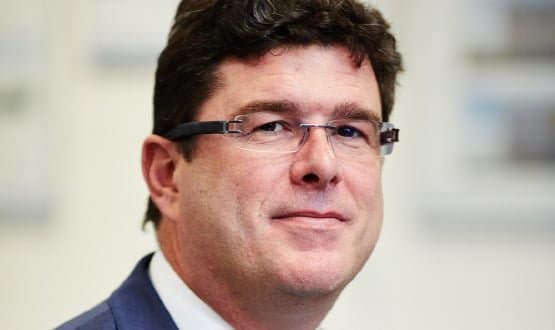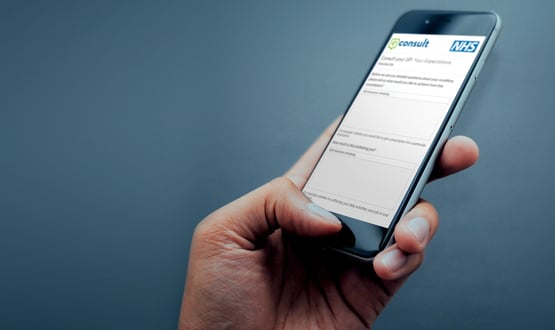Text and telephone consultations trump video during Covid-19

Telephone and text consultations have been favoured by patients’ during the Covid-19 pandemic but better data collection on the use of digital services is needed, according to the Digital Healthcare Council.
The use of digital primary care services has skyrocketed since the onset of coronavirus as face-to-face appointments needed to be reduced.
Digital Health News asked a number of suppliers how patient’s have been using their services since the start of the pandemic, and if this will change the way primary care services are delivered in the future.
Text and telephone consultations proved more popular than video consultations, which providers put down to video being newer than telephone and therefore less familiar.
Texts and telephone calls are also more convenient for patients as they aren’t required to set aside time to take part in a video chat.
But datasets on patients’ use of online consultations are unreliable, according to Graham Kendall, director of the Digital Healthcare Council.
“The data on the increase in online consultations in response to Covid are far from clear. Officially, GP appointment data actually show a drop in online consultations but we think this is much more due to the way that dataset is captured rather than a reflection of reality,” he told Digital Health News.
“That’s why the Digital Healthcare Council is calling for immediate changes in the way this information is collected. We need a reliable count of online appointments, including measures of availability and demand to be published.”
Individual providers have reported a “sizable” increase in demand across remote services, he said, adding that drop in referrals to secondary care coupled with reduced face-to-face appointments could lead to a “potentially catastrophic” backlog of patients.
“We need to do much more than substitute video consultations for what would have previously been face-to-face appointments,” he said.
“We need a fundamental shift in how we integrate packages of care. That means digital triaging, consultations which could be either online or face-to-face and in many cases both, and systematic follow-up and support which could include everything from targeted messaging, condition-specific apps, and traditional interventions.”
To get a better look at the use of digital services during the pandemic Digital Health News asked primary care suppliers for statistics on service use. Here’s what they had to say.
Docly
Docly have seen a near 40% increase in patient registrations since the beginning of March.
Dr Caroline Pilot, GP and Docly’s chief medical officer, said: “Our digital primary care service runs as an asynchronous (not in real-time) message-based service in the first instance, with the option to use video or offer a face-to-face appointment as and when it is needed.
“However, the majority of care can be delivered successfully and with greater efficiency by message-based consultations. Indeed, only 0.4 percent of message-based consultations converted to a video call since lockdown began, and only 4.65 percent of consultations required a physical follow-up.”
Dr Pilot believes the reason behind this is convenience. GP messaging enables faster, more convenient consultations than video or face-to-face, she said.
“The current environment is accelerating the use of remote working in all sectors. Until recently, healthcare has been behind the curve in this area, but it has a lot to gain by continuing to look forward and embracing the possibilities offered by technology,” she added.
“Text-based consultations are – in our own experience and in that of our patients’ – preferable, more convenient, and much more efficient for clinicians and patients alike, than other types of technology, including video.”
TPP
TPP has seen a 950% increase in the use of video services, although from a “very low base”. Telephone consultations have almost doubled and “still constitute by far and away the most popular form of remote consultation”, the provider said.
Matthew Stickland, director of strategy and communications at TPP, said: “Telephone consultation has been used in primary care for a long time so there is less process change to use this method of remote consultation.
“Video has been particularly popular with certain types of users – for example one of our community-based dermatology services is using Airmid video consultations regularly to see patients’ skin conditions.
“Obviously we do have to consider the digital divide too; for some patients the option of using video just isn’t possible.”
In the future though, Stickland believes video consultations will be “here to stay”.
“Prior to Covid-19 they really did form a very insignificant proportion of primary care contacts. I also think that we will make much more of online consultations where patients enter in symptoms and reasons for an appointment and they are triaged to the right place to receive care,” he added.
“With the increase of digital first solutions, we have a great opportunity to move more routine care into a remote environment and save precious face-to-face clinician time for those who require it.”
askmyGP
Some 53% of askmyGP’s patients have requested a response by phone call during the pandemic, followed by online messaging at 37%. Less than 1% requested video calls.
In the 12 weeks from 16 March the provider saw 433,687 patient requests for telephone consultations, 304,471 requests for online messaging and only 5,289 for video.
Again, the boiled down to convenience.
“This is hard to prove with certainty, but our experience is that patients are more concerned about receiving a quick and clear response to their question, rather than the way in which the contact with the practice takes place,” Harry Longman, chief executive of askmyGP said.
“Like many others, we have been surprised by the low demand for video consultations by patients. Anecdotally we have been told that patients feel like they have to ‘get ready’ for a video consultation.
Taking place at a fixed time a video consultation is more like a face to face appointment where the patient needs to get organised beforehand (if they’re feeling ill, this means getting out of bed, dressed etc). A phone call or secure online message in the patient’s own time and at their own pace will be preferable for many.”
Longman added the successful use of online tools during Covid-19 will lead patients to choose them more often after the pandemic.
Visiba Care
Visiba Care, which was selected by NHS England to deliver video consultations during the Covid-19 pandemic following a 48-hour tender, bucked the trend to see video preferred over messaging.
Since February the provider has had 84,971 video consultations compared to 3,319 messages between providers and patients in the UK and Sweden.
In the UK new user logins spiked by 5,927%.
“Many patients have tried online consultations for the first time and have candidly said that they would be happy to do so again,” Tina Marshall, Visiba Care’s UK country manager, said.
“Ultimately, making care more accessible will allow for prevention and early intervention, with long-term impacts for both population health and health financing. While there will always be a need for in-person interactions for certain types of care provision, using digital services where possible will free capacity to address those.”
eConsult
The number of patients using eConsult has risen from around 12 million to 25 million since the end of February, the provider said. The number of GPs registered with the service has also increased from 1,300 to almost 3,000.
The provider was unable to offer details on which services patients are opting to use, but said the majority still prefer a phone call or face-to-face appointment over video consultation.
Dr. Murray Ellender, chief executive of eConsult, said: “Phone and video, like face to face appointments, are not asynchronous so they all require both people to be available at the same time. eConsult allows patients to submit at any time and then the practice to respond based on the patient priority during their working hours.
“This means email or text responses are often the first response and can be used to ‘close’ eConsultations remotely or to advise that a synchronous appointment is needed.”
Ellender said he expects to see the use of digital services remain after lockdown has ended.
“Feedback shows that patients have expressed a desire for this service to remain after lockdown. This has been mirrored by practice staff too,” he added.
“Many practices and patients have said they feel Covid-19 has been the driver that has enabled the more cautious to try something new.”
Push Doctor
Push Doctor has expanded to reach more than 200,000 more NHS patients since the start of the pandemic.
In April, the number of partnerships with NHS providers had increased by 62%, making it the companies most successful month for partnership launches.
Dr Dan Bunstone, chief medical officer at Push Doctor, said: “Based on my personal experience, it feels like there’s a desire from both sides of the consultation for digital services to continue as it is currently being used.
“From a provider perspective, we’re delivering safe, high quality clinical care to patients in a way that’s more convenient for them and their lifestyle; if they can, there’s no need for them to show up physically to an appointment if it can be carried out remotely.
“For doctors, it’s about delivering effective and efficient care across a much wider geography to support the evolving PCN aspirations.”





1 Comments
Certainly on our Surgery Connect platform, we have seen an increase in nearly 70% of outbound phone consultation calls made since March with a similar phone-video ratio. The future lies in integrating all digital patient communications – phone, video, text, synchronous and asynchronous – into intuitive interfaces that give GP and patient a choice of communication – “omnichannel”.
Comments are closed.